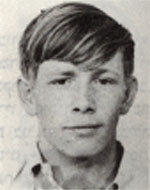Barur, Raphael
Raphael, son of Vida and Yosef, was born on April 2, 1954 in Poland and immigrated to Israel in 1960. He completed his elementary studies in Safed, where he lived with his parents, and then moved to the agricultural school in Nahalal, where he studied Until he reached the age of sixteen. When his family moved to Tel Aviv, Rafi completed his studies at the automotive mechanics school at the Armored Corps military boarding school. Crafts were Rafi’s main hobby. His room was full of woodcuts he made, and in other rooms of his parents’ house, splendid wooden tables, an artistic chessboard and other decorations remained as a mute setting for Rafi’s creative talent. In addition to this hobby, Rafi spent many hours hiking, fishing and caring for his father’s beehive. The faithful Zionist education that Rafi received at home shaped his character. Already in the Six-Day War, when he was only thirteen years old, he explained to his parents: “Since we want a land of our own, we must fight, each one has to give the maximum where he is.” His mental maturity and realistic outlook also helped him overcome About the disaster that struck him at the time, when his mother died. Rafael joined the Israel Defense Forces in mid-August 1972, and after completing his basic training, he was stationed in the Ordnance Corps, where he spent most of his military service in Sinai, where he worked in repair workshops for armored vehicles. “When the Yom Kippur War broke out, he gave his part in the heavy war, as his conscience dictated to him:” If we want our own land, we have to fight. “On the 17th of Cheshvan 1974 (12.11.1973), he fell during his service and was put to rest at the military cemetery in Kiryat Shaul, leaving a father and brother behind him, after which he was promoted to the rank of corporal. “His son was a devoted soldier, faithful to his work and acceptable to his comrades in the unit.” An obituary in Rafi’s memory was published in the booklet “Maabah,” the internal organ of the Jewish Agency workers’ organization, where his father worked.
